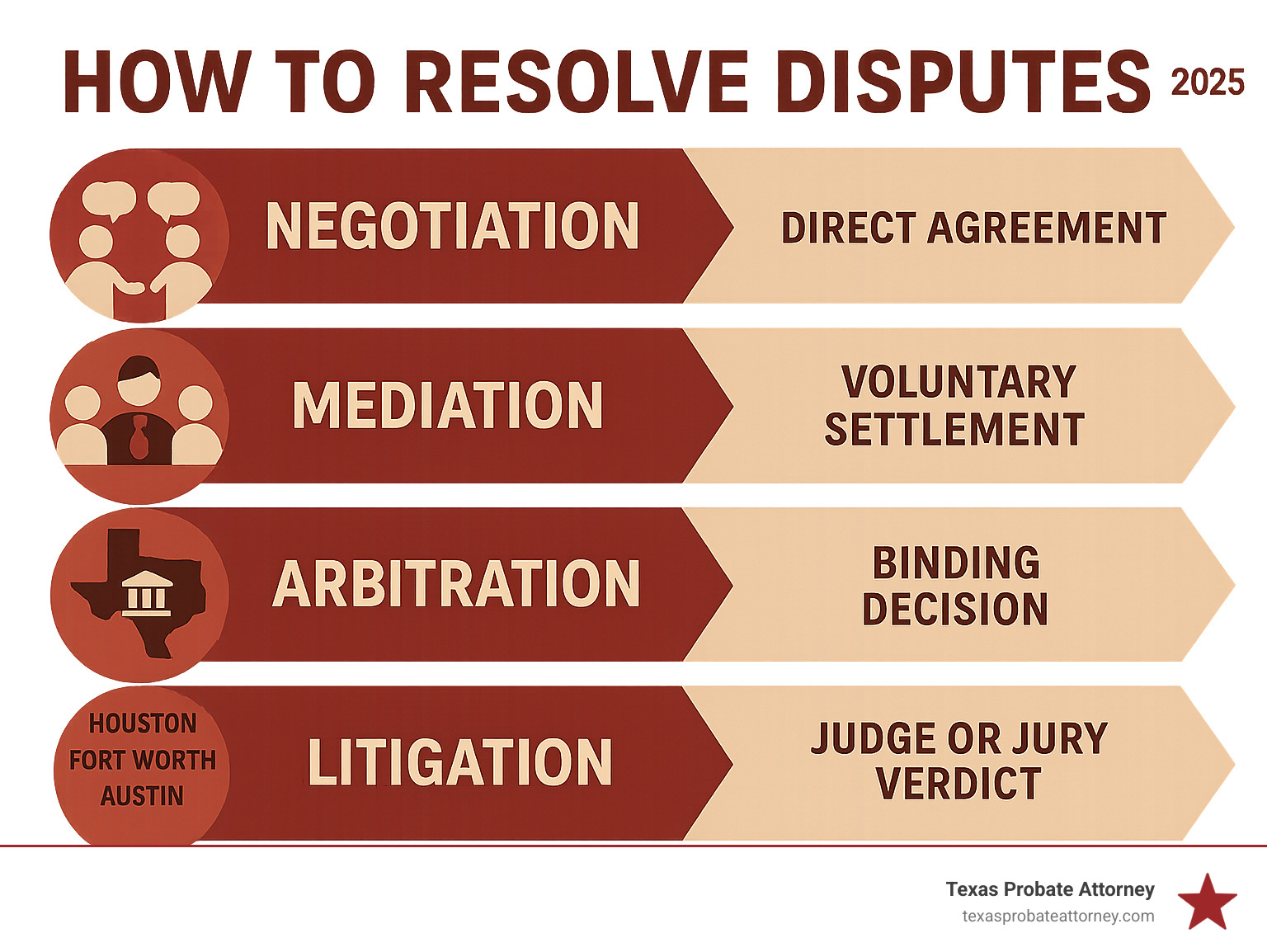Dispute Resolution Demystified: Steps to a Peaceful Outcome
Why Dispute Resolution Matters for Houston, Fort Worth, and Austin Families
How to resolve disputes doesn’t have to mean years in a Texas courtroom. For estate, trust, or family conflicts in Houston, Fort Worth, or Austin, you have paths to peace without the stress and expense of litigation.
Quick Answer: The 4 Main Ways to Resolve Disputes:
- Negotiation – Direct discussion between parties to reach agreement
- Mediation – Neutral third party helps facilitate discussion and agreement
- Arbitration – Neutral third party hears both sides and makes a binding decision
- Litigation – Traditional court process with a judge or jury deciding the outcome
In the busy court systems of Harris (Houston), Tarrant (Fort Worth), and Travis (Austin) counties, only a small fraction of filed cases—often cited as low as 5%—ever reach a trial verdict. Most disputes settle beforehand, which means there are better, faster, and cheaper ways to resolve your conflict.
Whether you’re facing a probate dispute in Houston, a trust conflict in Fort Worth, or an estate disagreement in Austin, understanding your options can save you time, money, and emotional stress.
Alternative Dispute Resolution (ADR) methods like mediation and arbitration are often better than litigation because they:
- Cost significantly less than court battles
- Resolve disputes in weeks or months instead of years
- Keep your family matters private
- Let you maintain control over the outcome
- Help preserve important relationships
The key is knowing when to use each method and how to prepare for success.
Simple How to resolve disputes word guide:
Understanding Your Options: Alternatives to a Texas Courtroom Battle
If you’re facing a family estate dispute in Houston or a trust disagreement in Austin, you might think court is your only option. However, how to resolve disputes doesn’t have to mean a lengthy courtroom battle. Alternative Dispute Resolution (ADR) offers Houston, Fort Worth, and Austin families a different path. Instead of litigation’s “winner takes all” approach, ADR lets you control the resolution.
Cost savings make ADR worth considering. Skipping expensive depositions, court filings, and hearings shrinks legal bills. We’ve seen families save tens of thousands by choosing mediation over litigation for their estate disputes.
Time efficiency is another benefit. A lawsuit in Harris, Tarrant, or Travis County can take years, while ADR often concludes in weeks or months, letting you move on with your life.
Privacy is crucial for sensitive family matters. Court proceedings are public record. ADR keeps your affairs confidential, a key reason Fort Worth families prefer it for trust and estate disputes.
Most importantly, ADR gives you control over the outcome. You help craft solutions that work for your family, rather than having a judge decide your future. This leads to more durable agreements.
Negotiation: The First Step in Resolving Disputes
The simplest way how to resolve disputes often starts with direct communication. Negotiation is an informal and voluntary discussion between the people involved to work toward a solution without a judge or mediator. You can negotiate with or without attorneys, though for complex Houston business and estate disputes, legal guidance is invaluable. We help clients prepare, understand their rights, and develop strategies that protect their interests while finding common ground. The key to successful negotiation is focusing on issues, not personalities, and listening to what the other party truly needs.
For more information about how we help our clients with resolving legal disputes, click here: More info about resolving legal disputes
Mediation: Finding Common Ground with a Neutral Guide
When direct negotiation fails, mediation is a powerful way how to resolve disputes. A mediator is a neutral third party who facilitates discussion and guides parties toward a solution, but does not make decisions. They act as a translator between frustrated parties.
Mediation is non-binding, so you are never forced to accept an agreement you don’t like. It’s also confidential, allowing people to speak honestly without fear their words will be used against them later. For families in Fort Worth and Austin dealing with estate or trust disputes, mediation is excellent for preserving relationships. It allows for creative agreements a judge could never order, such as dividing assets based on what each person actually wants and needs.
We believe that mediation can solve many family disputes. Find out more here: Could Mediation Solve Our Family Dispute?
Arbitration: A Private Judge for Your Disagreement
When you need a decision but want to avoid a two-year wait for a court date in Houston, Fort Worth, or Austin, arbitration is an option. Think of it as hiring a private judge to resolve disputes quickly. An arbitrator is a neutral party who hears both sides, reviews evidence, and makes a decision.
Arbitration can be binding or non-binding. A binding decision is final, like a judge’s ruling, with very limited appeal rights. Non-binding arbitration provides an expert opinion you can accept or reject, often serving as a basis for settlement talks. The process is less formal than court but more structured than mediation, offering privacy, speed, and an arbitrator who often specializes in your type of dispute. For probate and trust disputes in Houston, Fort Worth, and Austin, this means a decision from someone who understands Texas estate law. By agreeing to arbitration, you typically give up your right to a trial, a significant decision we ensure our clients fully understand.
For more on how mediation can be used in probate cases, see: Using Mediation in Probate Cases
How to Resolve Disputes Using Alternative Dispute Resolution (ADR)
Knowing your options is just the start; the real power is understanding how to resolve disputes effectively. We’ve guided countless Houston, Fort Worth, and Austin families through ADR, and success depends on smart strategies custom to Texas law and local court practices.
The key is approaching ADR with the same preparation and strategic thinking as any legal matter. We help our clients steer each step, from choosing the right method to preparing for the process.
When to Choose ADR Over Litigation in Texas
Choosing between ADR and litigation can be overwhelming. We help our Houston, Fort Worth, and Austin clients evaluate their situation using clear criteria from our 40+ years of combined practice.
Cost-effectiveness is a primary concern. In major Texas metropolitan areas like Houston, Fort Worth, and Austin, only about 5% of filed cases go to trial; the rest settle. Why spend tens of thousands preparing for a trial in a Harris, Tarrant, or Travis County court that’s unlikely to happen? ADR methods typically cost a fraction of full litigation and achieve resolution much faster.
Speed matters in family or business disputes. The dockets in Harris, Tarrant, and Travis County courts are notoriously busy, and securing a trial date can take years. Mediation or arbitration can resolve complex disputes within weeks or months, a critical advantage for our clients in Houston, Fort Worth, and Austin.
Privacy needs are crucial for many families. Court proceedings in Houston, Fort Worth, and Austin are public record. ADR keeps your private matters confidential, which is vital in probate and trust disputes involving sensitive family information within these communities.
Creative solutions are where ADR shines. Courts are bound by law, but in mediation, you can craft custom agreements that work for your specific family situation, like how to divide a family ranch versus other assets.
Preserving relationships in Texas communities is often essential. When you’ll still see each other after the dispute, ADR’s focus on communication and cooperation is better than adversarial combat.
That said, we are experienced litigators and are not afraid of the courtroom when necessary. We always explore ADR first as it often provides a more efficient path for our clients.
To learn more about protecting your estate, read: Is Your Estate at Risk for Probate Litigation?
How to resolve disputes even after a lawsuit is filed
Filing a lawsuit doesn’t close the door on other ways to how to resolve disputes. Even with active litigation in Houston, Fort Worth, or Austin courts, you can and often should pursue ADR. ADR can work as a parallel process to litigation. In fact, many probate courts in Harris, Tarrant, and Travis counties require parties to try mediation before they will set a final trial date. This is called court-ordered mediation.
We frequently guide clients through settlement negotiations during ongoing lawsuits. You can agree to pause litigation while attempting ADR. If you reach an agreement, the lawsuit is dismissed. If not, you resume where you left off. This flexibility is powerful, as the findy (fact-gathering) phase of litigation can sometimes clarify positions and make parties more willing to settle.
Understanding litigation can help you see the value of ADR: What is Estate Litigation?
Situations Where a Texas Lawsuit Might Be Necessary
While we believe in ADR, our 40+ years of combined experience shows that sometimes court is the only way to how to resolve disputes. As seasoned litigators, we are prepared to go to trial when it serves your best interests.
Litigation may be necessary for:
- Establishing legal precedent: If your case involves a novel legal question under Texas law, a court ruling from a Houston, Fort Worth, or Austin judge can clarify the law for others.
- Significant power imbalance: When dealing with a difficult party in the Houston, Fort Worth, or Austin area, courts have tools to compel findy and ensure fairness that ADR lacks.
- Bad faith opponents: Litigation may be the only option against parties in a local dispute who hide assets, refuse to cooperate, or use delay tactics.
- Requiring court orders: Removing a trustee, compelling an accounting, or enforcing a will often needs a formal order from a Harris, Tarrant, or Travis County court.
- Public record: Sometimes a public record of the dispute in the local county courthouse is necessary to deter future conduct or for other legal reasons.
Cases involving Breach of Trust in Texas often require litigation, as you may need the court’s power to recover damages and hold a trustee accountable.
Finding the Right Professional to Guide Your Resolution in Houston, Fort Worth, or Austin
When facing a complex probate or trust dispute in Texas, having the right professional is critical. For residents of Houston, Fort Worth, and Austin, finding the right mediator or arbitrator means selecting someone who understands the local legal landscape and has deep experience with your specific type of dispute.
Not all neutrals are created equal. A mediator skilled in business disputes might struggle with sensitive family inheritance matters, while an arbitrator for contracts may not grasp complex trust issues.
How to resolve disputes with Mediators and Arbitrators
When you’re ready to how to resolve disputes via mediation or arbitration, understanding the roles of these professionals is key.
Mediators are facilitators who help you find common ground. They don’t make decisions but guide conversations and suggest creative solutions.
Arbitrators act more like private judges. They hear both sides, review evidence, and make a decision that can be binding.
Here’s a comparison:
| Feature | Mediator | Arbitrator |
|---|---|---|
| Role | Facilitates communication; helps parties reach their own voluntary agreement. | Hears evidence and arguments; makes a binding or non-binding decision. |
| Decision-Making Power | None; parties retain full control over the outcome. | Full; acts like a private judge, rendering a decision. |
| Process | Informal, flexible, confidential; focused on interests and common ground. | Less formal than court but more structured than mediation; confidential; focused on evidence and rules. |
| Outcome | Voluntary agreement, often a compromise that all parties help create. | A definitive decision, which may or may not be appealed depending on the arbitration agreement. |
| Appeal Rights | No appeal, as agreements are voluntary. | Very limited, especially in binding arbitration. |
When selecting a neutral in Texas, ask if they have proper training and the right background for your conflict, especially for probate and trust disputes. True impartiality is essential. For arbitrators, many are retired judges or experienced attorneys with years of relevant experience.
Finding qualified professionals in Houston, Fort Worth, and Austin is straightforward. We often provide referrals to respected mediators and arbitrators specializing in local probate, trust, and estate matters. Additionally, these cities have excellent local resources, such as the Harris County Dispute Resolution Center, Dispute Resolution Services of North Texas (serving Fort Worth), and the Austin Dispute Resolution Center. The State Bar of Texas and professional organizations like the Texas Association of Mediators also maintain lists of qualified neutrals. The key is finding someone with the right credentials and fit for your challenging situation.
For more resources on dispute resolution in Texas, you can check out: Dispute Resolution Centers in Texas
Frequently Asked Questions about Resolving Disputes in Houston, Fort Worth, and Austin
Our clients in Houston, Fort Worth, and Austin often have practical questions about alternatives to court. With over 40 years of combined experience in estate, trust, and probate disputes, we’ve addressed most concerns about how to resolve disputes using alternative methods.
Is a mediated agreement legally binding in Texas?
Yes, a mediated agreement can be legally binding in Texas, but it isn’t automatic. For the agreement to be enforceable, it must be written down, signed by all parties, and properly documented. The mediation is the discussion; the signed document is the enforceable contract.
This is where experienced legal counsel is critical. We ensure any agreement you reach protects your interests, accurately reflects your intent, and is legally enforceable under Texas law. A handshake deal is a risk not worth taking in complex family or estate matters.
For legal assistance with mediation and arbitration services, consult with us: Mediation and Arbitration Services Attorneys
What happens if I don’t like the arbitrator’s decision?
This depends on the type of arbitration you agreed to initially.
In binding arbitration, the decision is final, much like a judge’s ruling. In Texas, you can’t appeal just because you disagree with the outcome. Challenges are only possible in very limited circumstances, such as fraud or arbitrator misconduct.
In non-binding arbitration, the decision is more of an expert opinion. You can reject it and pursue other options, like going to court. However, the decision is still valuable, as it shows how a neutral party views your case and can facilitate settlement talks.
It is crucial to understand whether the arbitration will be binding or non-binding before you commit. We ensure our clients understand these implications fully.
How much does ADR cost compared to litigation in Houston or Fort Worth?
ADR methods like mediation and arbitration typically cost significantly less than full-scale litigation in Houston, Fort Worth, or Austin. The savings are dramatic for several reasons.
ADR processes are streamlined, requiring fewer attorney hours. The costs of the mediator or arbitrator are usually split between the parties. The less formal nature means fewer documents and court appearances. Since preparing for a trial that may never happen (only 5% of cases go to trial) is a major litigation expense, ADR helps you avoid these costs.
A complex probate dispute in Houston that could cost tens or hundreds of thousands to litigate might be resolved through ADR for a fraction of that amount. The initial investment in ADR often saves families a fortune.
For more on the financial aspects of estate disputes, including how we help, read: Estate Drama? Call a Probate Litigation Attorney in Houston
Your Path to a Peaceful Resolution
Family disputes and trust conflicts in busy Texas communities like Houston, Fort Worth, and Austin are difficult, especially when they involve loved ones and important assets. We understand these situations are never easy.
The good news is that how to resolve disputes doesn’t require destructive courtroom battles. ADR offers Houston, Fort Worth, and Austin residents a better way forward—one that’s faster, more private, less expensive, and more customized than traditional litigation.
Empowerment through choice is what sets ADR apart. Instead of a judge in a Harris, Tarrant, or Travis County courthouse deciding your fate, you become an active participant in crafting a solution that protects what matters most and can preserve important relationships.
Taking control of your dispute means working toward a resolution that makes sense for your unique situation. Whether it’s a probate matter in Houston, a trust disagreement in Fort Worth, or an estate conflict in Austin, you have options that can lead to better outcomes.
However, you shouldn’t go it alone. The importance of skilled legal guidance is paramount. We’ve seen people handle complex disputes without proper support, resulting in agreements that fail to protect their interests or create new problems.
At Texas Probate Attorney, we bring over 40 years of combined experience to every case. We know when to negotiate, when to mediate, and when it’s time to go to court. Our job is to protect your rights, ensure your voice is heard, and see that any agreement is both fair and legally enforceable.
For complex fiduciary, trust, and estate disputes in Houston, Fort Worth, or Austin, you need someone who understands the law and the human side of these conflicts. We’re here to help you find a peaceful resolution.
Contact a Texas Fiduciary Litigation Attorney





